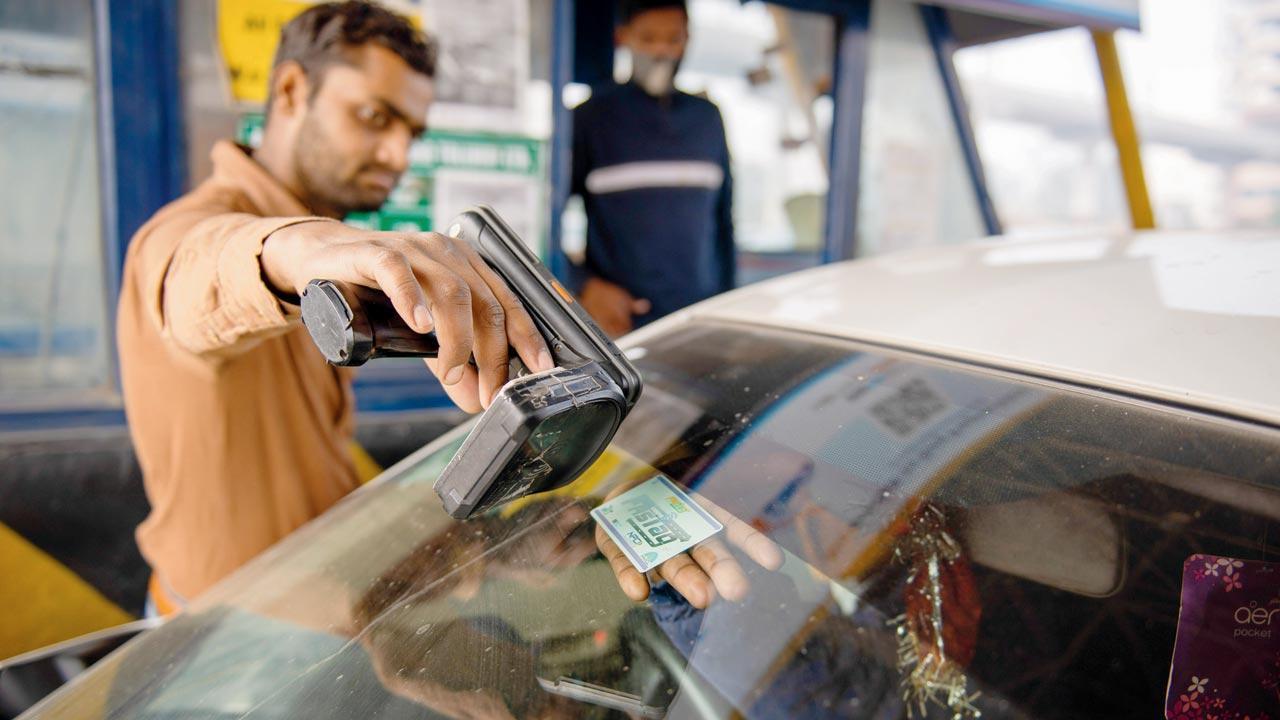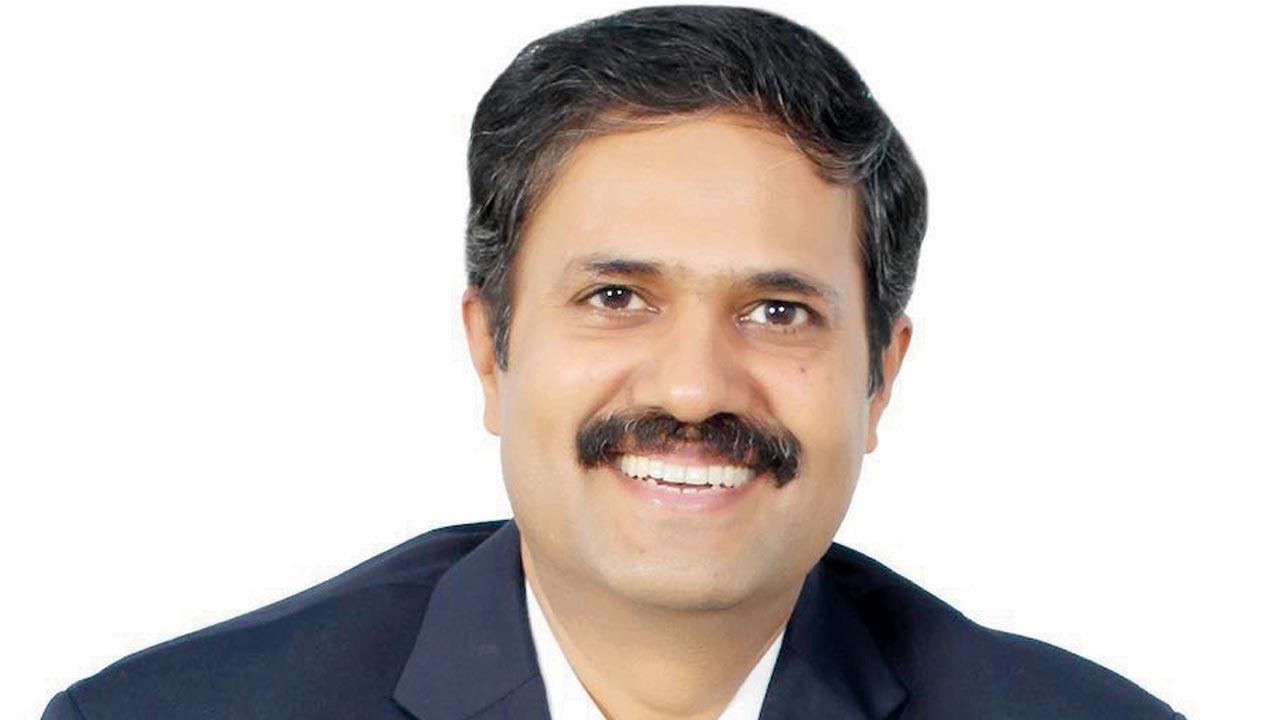The project head of Road Safety 2.0 talks about why incorporating technology into road safety might just be easier now than a decade ago

A man scans a FASTag pass at the Khatela Sarai toll plaza. Pic/Getty Images
Each time Akhilesh Srivastava sees vehicles cruising past toll gates using the FASTag corridor, his eyes light up. It’s not only because the sticker that uses RFID (Radio Frequency Identification) technology, stuck on windshields, has reduced the waiting time at booths, but also because it has helped the government save Rs 20,000 crore per annum on fuel. It has also brought in additional revenue totalling Rs 10,000 crore. During his tenure as the Chief General Manager of NHAI (National Highways Authority of India), Srivastava’s foremost contribution was creating and developing this innovation. The civil engineer from IIT and former COO of Indian Highway Management Company Ltd is considered one of the most tech-savvy bureaucrats in the system. Srivastava, however, wears his scholarship lightly. “I joined the government services because I wanted to influence change and modernisation. Even as a junior engineer, I would perennially think about how we could use technology in the smallest transactions,” he says. His AI-based Data Lake for NHAI, a centralised repository that allows you to store all your structured and unstructured data at any scale, served as the blueprint for the recently launched Gati Shakti programme, a digital platform to bring 16 ministries including the Railways and Roadways together for integrated planning and coordinated implementation of infrastructure connectivity projects.
ADVERTISEMENT
Srivastava has now trained his lens on a more pressing and lethal problem: road accidents. He has been roped in as the Project Head of Road Safety 2.0, an associated initiative with the World Economic Forum. The objective is technology adoption into all four Es of road safety—Education, Engineering, Enforcement and Emergency Care. As per a World Road Safety report from 2018, India is on the top of the list of 199 countries in number of road fatalities, with 11 per cent of the global road fatalities taking place in India alone.
 Akhilesh Srivastava
Akhilesh Srivastava
Last month, while addressing a webinar organised by the International Road Federation, Union Minister Nitin Gadkari said that the road accident incidents in the country were “much more serious than the COVID pandemic” and that we have reached an “an alarming situation”. Seventy per cent deaths are in the working age group of 18 to 45 years. Srivastava says nearly 75 per cent of road accidents take place due to human errors such as overspeeding, fatigue, stress and poor driving skills. He is also aware that previous efforts to bring down the statistics have not yielded desired results. “In my opinion, until now it’s been a top-down approach. You hold seminars and conferences and expect the learnings to trickle down. That won’t happen. We need to go bottom-up. So now, we are using localised tools such as the Hum Safer app that gently nudges drivers on their safety and good driving behaviour, offering monetary rewards that are credited straight to the driver through UPI and insurance and other medical aid that they can register for through the app.”
The response to technology has been tremendous over the past few years, he notes. “Most street vendors and rickshaw drivers have UPI or phones which support apps and we are way more open to embrace digitisation than we were 10 years ago.” Tamil Nadu, he observes, has done a stellar job of implementing road technology by installing cameras to monitor busy traffic roads, sensors on highways and a good incident recording system which has reduced accidents in the state. “We tried a similar strategy on Delhi-Mumbai Expressway by identifing blind spots and providing incentives to drivers and there’s been a 50 per cent reduction in accidents in the last three months.”
Srivastava, who lives in Gurugram, makes it a point to begin his day at 5 am which is followed by site visits, meeting contractors and engineers, liaising with local municipal corporations and poring over the technical details of upcoming projects. He wraps up work post 9 pm. It does get exhausting, he admits. But writing helps him wind down. Like his projects, his blog, not so surprisingly, is also about technology—with posts titled 5 Ways in Which AI & Machine Learning add a “Humane” Approach to the Construction Industry, and Exploring a New Frontier in Governance with the Power of AI. “There is nothing quite like the feeling of reaching the end of a project that you have been working on for months and finally seeing the system in operation.” With Project Head of Road Safety 2.0, he knows it will be a long journey. But, he smiles, “One of the primary requirements of my job is patience.”
199
Number of countries India has beaten to top the Number of Road Fatalities List, according to the World Road Safety report 2018
Srivastava’s roadmap
. Successfully led India’s first GPS-based tolling pilot on 1,450 Km long Delhi-Mumbai stretch.
. Involved in developing the e-Tendering (CPPP) Portal with the National Informatics Centre (NIC).
. Development of the first e-MB Portal, now being used by many PSUs.
. Development of India’s first Online Dispute Portal (ODR) with CIDC launched by the Vice President of India in 2017.
 Subscribe today by clicking the link and stay updated with the latest news!" Click here!
Subscribe today by clicking the link and stay updated with the latest news!" Click here!







